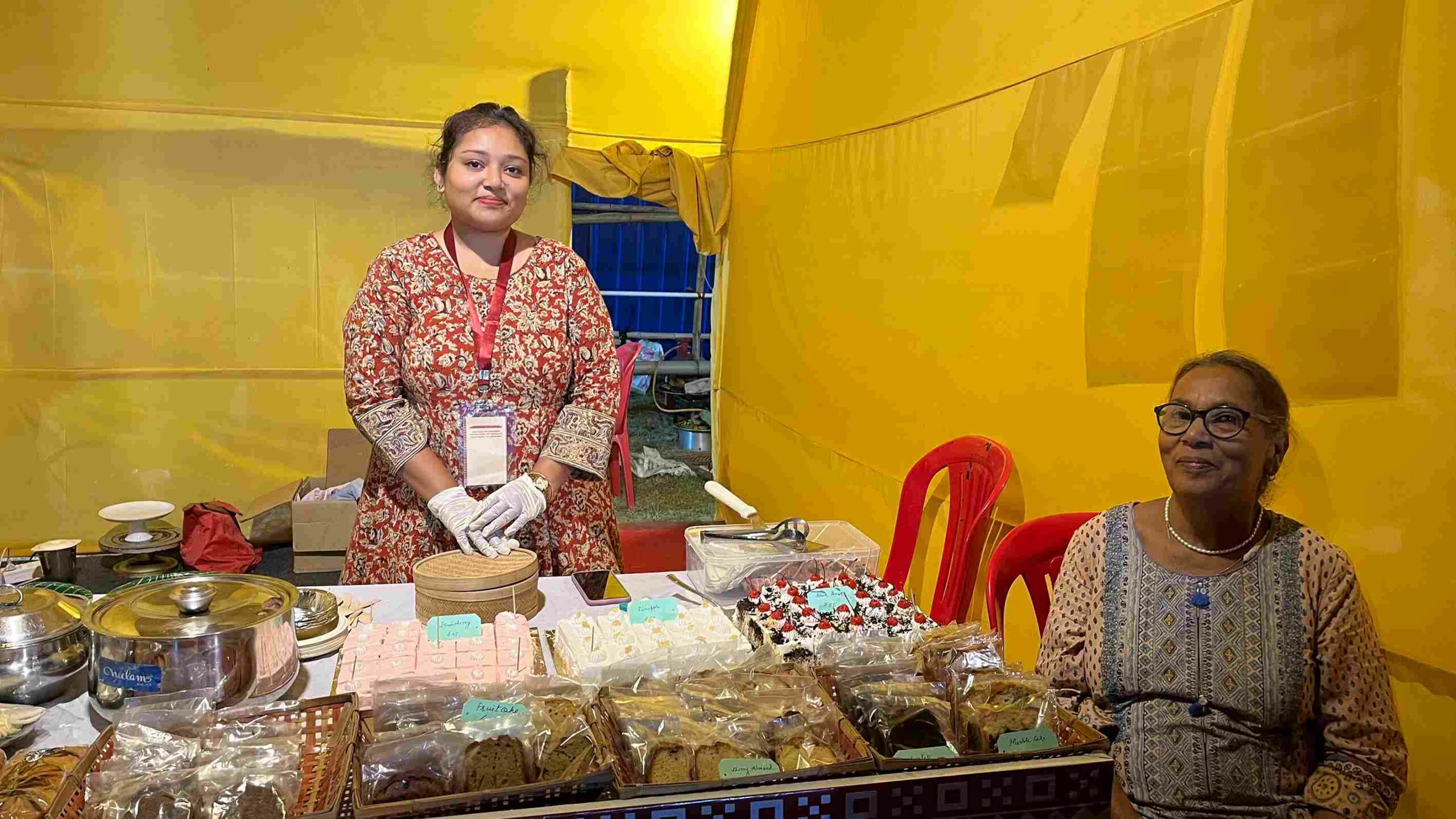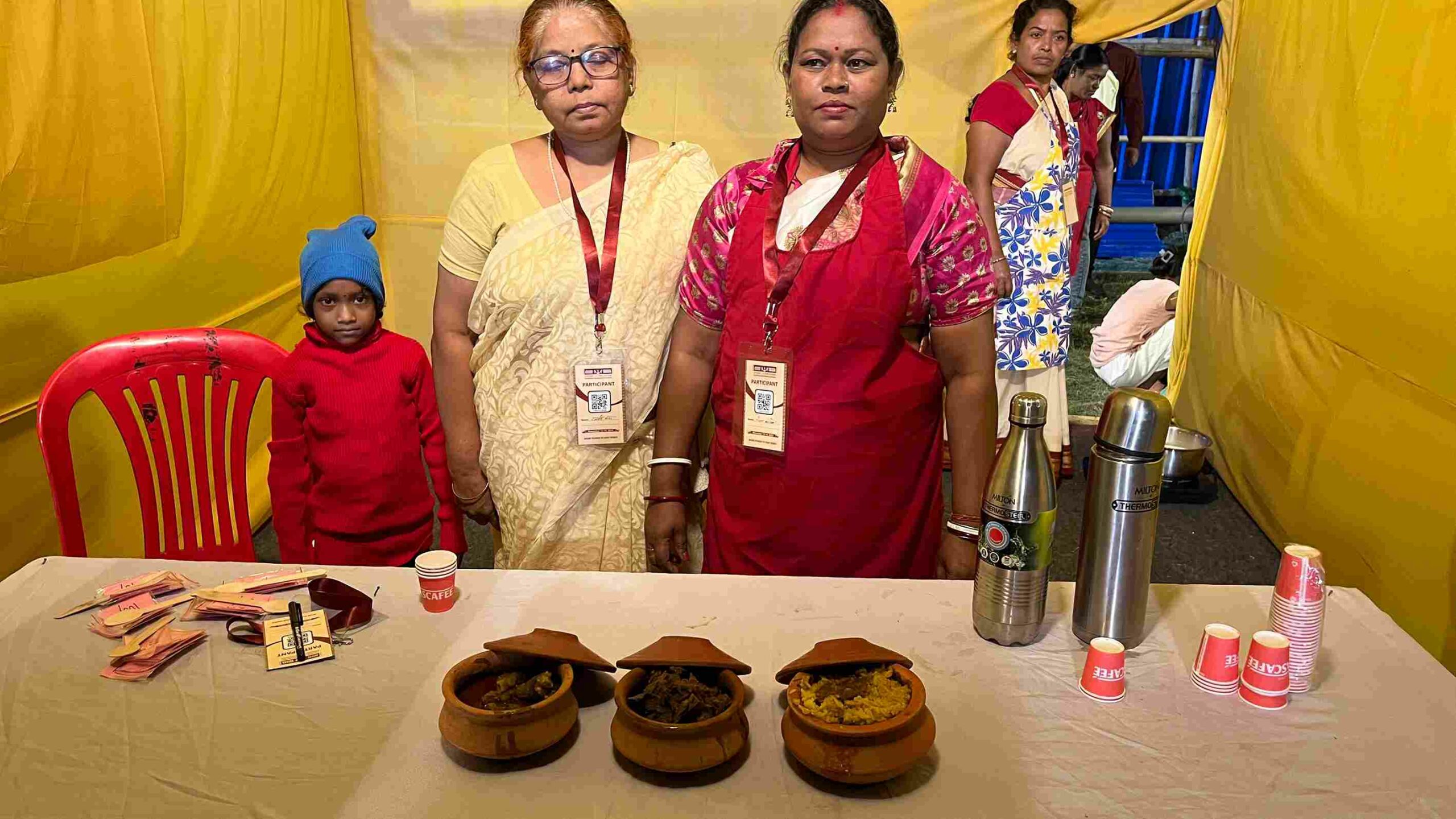This article has been published in partnership with Samvaad – Enabled by Tata Steel Foundation
Ragi samosa from Odisha; chuu tagi from Ladakh; murri pandullu from Telangana; hau chutney from Odisha’s Mayurbhanj district; dudh puli from West Bengal; ragi dosa from Tamil Nadu — when you come across these delicious but less popular dishes from across India, you are bound to set off on a gastronomical voyage.
But where can you find them?
All these culinary delicacies were available at Samvaad — enabled by Tata Steel Foundation (TSF). The conclave honours tribal culture via art, healing, food, and more.
The five-day annual conclave — from 15 to 19 November, 2023 — in Jamshedpur, brought together 140 home chefs belonging to 35 tribes from 17 states. Samvaad is a platform for healers, artists, chefs, filmmakers, and entrepreneurs to showcase their culture and actively contribute to the development of their communities.
Stepping onto its tenth year in 2023, the theme for this edition was ‘Walk with Me’. It acknowledged the journey of ideas, dialogues, individuals, and collectives among India’s tribes. The participants looked back on their journey and shared their experiences and stories at various events, expressing how the conclave helped them resolve social and economic challenges within their communities.
Over 500 people gathered at the open-air Amphitheatre at Tribal Culture Centre (TCC) for ‘Akhra’ — a journey through powerful personal and collective narratives, and ‘Samuday ke Saath’ — a platform to share one’s artistic expressions of their own life’s trajectory or inspired by others’ lived experiences.
Over the years, Samvaad has celebrated and brought together more than 40,000 individuals from over 200 tribes in India and 17 other countries.

‘Cuisine connects us with the outside world’
Food is central to one’s sense of identity and plays an integral role at Samvaad. Every ingredient, be it vegetable, fruit, or spice, used in a dish represents a community’s biology and sociology, and forms a larger part of its historical narrative.
The Better India spoke to chefs from different parts of India and even got an opportunity to relish some of their food at Gopal Maidan. Despite the difference in their preparation styles and ingredients used, something unified the communities.
For instance, Vasantha from the Irula tribe of Tamil Nadu said ragi (finger millet) is the primary cereal in her village. They use it to make dosa and ragi balls. Meanwhile, Santi Bairak from the Chik Baraik tribe of Odisha uses ragi to make fritters, samosa, manchurian and even milkshakes. Then there is also Swati from the Oraon tribe who makes ragi cakes and pastries.
Although the taste of their dishes — umami, spicy and sweet — are poles apart, the reason for using ragi is the same — health benefits and easy access. And it got more interesting when Vasantha took a leaf out of Santi’s culinary book, went back home, and experimented with it!
For Vasantha, Santi and other chefs, their role goes beyond cooking and showcasing their food; it is a way to connect their community with the outside world.
“Food is actually the easiest way to initiate a conversation with strangers. However, though people may connect via Punjabi, Gujarati, or Goan cuisine, rarely are they aware of tribal cuisine. Part of the problem is the blanket labelling of tribal foods under the term ‘indigenous’, when in fact our food is as diverse as it can get. So, when people visit my stall, I make sure to educate them about our tribe’s history and why we use certain ingredients the way we do,” said Palash Mallick from West Bengal’s Lodha tribe.
He was happy that the sales of his star dish ‘dudh puli’ (rice dumplings) have increased over the years. The fried dumplings are made with rice flour, coconut, jaggery and milk.
A few stalls away, Pritesh Kumar from the Oraon tribe’s Khalko clan excitedly narrated the fascinating story behind each dish while offering free samples. “The baas (bamboo) pickle is good for your blood, and the demta chutney made from red weaver ants is rich in protein and calcium. Jamun powder helps control sugar,” he told the potential customer at his stall.

When asked how cuisine helps uplift his community, Pritesh said, “We get to tell our stories through cuisine by shedding light on ingredients, preparation methods, taste and more. Get us more stalls like these. We will not only survive but also flourish. We offer foods that may not be available everywhere in India. Every generation closely guards these recipes. It is our fourth time here [at the conclave]. Every year, we receive orders from across India once we go back home.”
Mentioning the controversial plant of mahua (Madhuca longifolia), he added, “Mahua is unfortunately only popular as an alcoholic drink and hence people assume our community is backwards due to this. What many people don’t know is that mahua can be used to make pickles and cookies as well. They have several health benefits. We aim to bring these dishes into the mainstream.”
Pritesh and his family earn five months’ worth of earnings within two days at Samvaad. He expressed hope that future generations will be eager to learn these recipes now due to its increasing market demand.
Geeta Sandil of the Munda tribe, who was participating in the conclave for the second time, said she had seen similar profits because of Samvaad.
“I thought we were the only ones, but I was pleasantly surprised to see so many tribal communities. We sold a lot last year, so we are back with several new additions like chicken khichdi, duck meat, dhuska, masoor dal pakoda (lentil fritters) and khasi pieces (goat legs). These dishes are good for bones, kidney stones, heart and gut. We prepare all the spices at home,” she told The Better India.
Seeing the positive response here, Geeta expressed her desire to quit her restaurant job and start her own food service.
Samvaad is helping participants like Geeta who wish to walk on the entrepreneurial road. For instance, this year, it tied up with Zomato to home-deliver traditional cuisines prepared at the conclave across Jamshedpur for five days!
That’s not all, tribal cuisine has been taking over luxury dining tables, as TSF collaborated with Indian Hotels Company Limited (IHCL) to put up food carnivals and workshops at the Taj chain of hotels.
(Edited by Pranita Bhat; All photos courtesy: Gopi Karelia)
No comments:
Post a Comment